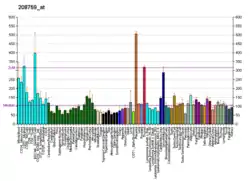Nicastrin
Nicastrin, also known as NCSTN, is a protein that in humans is encoded by the NCSTN gene.[5][6][7]
Function
Nicastrin (abbreviated NCT) is a protein that is part of the gamma secretase protein complex, which is one of the proteases involved in processing amyloid precursor protein (APP) to the short Alzheimer's disease-associated peptide amyloid beta. The other proteins in the complex are PSEN1 (presenilin-1), which is the catalytically active component of the complex, APH-1 (anterior pharynx-defective 1), and PEN-2 (presenilin enhancer 2).[8] Nicastrin itself is not catalytically active, but instead promotes the maturation and proper trafficking of the other proteins in the complex, all of which undergo significant post-translational modification before becoming active in the cell.[9] Nicastrin has also been identified as a regulator of neprilysin, an enzyme involved in the degradation of amyloid beta fragment.[10]
History
The protein was named after the Italian country Nicastro, reflecting the fact that Alzheimer's disease was described in 1963 after studying descendants of an extended family originating in the country of Nicastro that had familial Alzheimer's disease (FAD).[11]
References
- GRCh38: Ensembl release 89: ENSG00000162736 - Ensembl, May 2017
- GRCm38: Ensembl release 89: ENSMUSG00000003458 - Ensembl, May 2017
- "Human PubMed Reference:". National Center for Biotechnology Information, U.S. National Library of Medicine.
- "Mouse PubMed Reference:". National Center for Biotechnology Information, U.S. National Library of Medicine.
- "Entrez Gene: NCSTN nicastrin".
- Nagase T, Seki N, Ishikawa K, Ohira M, Kawarabayasi Y, Ohara O, Tanaka A, Kotani H, Miyajima N, Nomura N (Oct 1996). "Prediction of the coding sequences of unidentified human genes. VI. The coding sequences of 80 new genes (KIAA0201-KIAA0280) deduced by analysis of cDNA clones from cell line KG-1 and brain". DNA Research. 3 (5): 321–9, 341–54. doi:10.1093/dnares/3.5.321. PMID 9039502.
- Yu G, Nishimura M, Arawaka S, Levitan D, Zhang L, Tandon A, Song YQ, Rogaeva E, Chen F, Kawarai T, Supala A, Levesque L, Yu H, Yang DS, Holmes E, Milman P, Liang Y, Zhang DM, Xu DH, Sato C, Rogaev E, Smith M, Janus C, Zhang Y, Aebersold R, Farrer LS, Sorbi S, Bruni A, Fraser P, St George-Hyslop P (Sep 2000). "Nicastrin modulates presenilin-mediated notch/glp-1 signal transduction and betaAPP processing". Nature. 407 (6800): 48–54. Bibcode:2000Natur.407...48Y. doi:10.1038/35024009. PMID 10993067. S2CID 4339220.
- Kaether C, Haass C, Steiner H (2006). "Assembly, trafficking and function of gamma-secretase" (PDF). Neuro-Degenerative Diseases. 3 (4–5): 275–83. doi:10.1159/000095267. PMID 17047368. S2CID 17324271.
- Zhang YW, Luo WJ, Wang H, Lin P, Vetrivel KS, Liao F, Li F, Wong PC, Farquhar MG, Thinakaran G, Xu H (Apr 2005). "Nicastrin is critical for stability and trafficking but not association of other presenilin/gamma-secretase components". The Journal of Biological Chemistry. 280 (17): 17020–6. doi:10.1074/jbc.M409467200. PMC 1201533. PMID 15711015.
- Pardossi-Piquard R, Dunys J, Yu G, St George-Hyslop P, Alves da Costa C, Checler F (May 2006). "Neprilysin activity and expression are controlled by nicastrin". Journal of Neurochemistry. 97 (4): 1052–6. doi:10.1111/j.1471-4159.2006.03822.x. PMID 16606360.
- Feldman RG, Chandler KA, Levy LL, Glaser GH (Oct 1963). "Familial Alzheimer's disease". Neurology. 13 (10): 811–24. doi:10.1212/wnl.13.10.811. PMID 14066996. S2CID 32600780.
- Yu G, Nishimura M, Arawaka S, Levitan D, Zhang L, Tandon A, Song YQ, Rogaeva E, Chen F, Kawarai T, Supala A, Levesque L, Yu H, Yang DS, Holmes E, Milman P, Liang Y, Zhang DM, Xu DH, Sato C, Rogaev E, Smith M, Janus C, Zhang Y, Aebersold R, Farrer LS, Sorbi S, Bruni A, Fraser P, St George-Hyslop P (Sep 2000). "Nicastrin modulates presenilin-mediated notch/glp-1 signal transduction and betaAPP processing". Nature. 407 (6800): 48–54. Bibcode:2000Natur.407...48Y. doi:10.1038/35024009. PMID 10993067. S2CID 4339220.
- Haffner C, Frauli M, Topp S, Irmler M, Hofmann K, Regula JT, Bally-Cuif L, Haass C (Aug 2004). "Nicalin and its binding partner Nomo are novel Nodal signaling antagonists". The EMBO Journal. 23 (15): 3041–50. doi:10.1038/sj.emboj.7600307. PMC 514924. PMID 15257293.
- Baulac S, LaVoie MJ, Kimberly WT, Strahle J, Wolfe MS, Selkoe DJ, Xia W (Nov 2003). "Functional gamma-secretase complex assembly in Golgi/trans-Golgi network: interactions among presenilin, nicastrin, Aph1, Pen-2, and gamma-secretase substrates". Neurobiology of Disease. 14 (2): 194–204. CiteSeerX 10.1.1.624.6715. doi:10.1016/S0969-9961(03)00123-2. PMID 14572442. S2CID 53205510.
- Gu Y, Chen F, Sanjo N, Kawarai T, Hasegawa H, Duthie M, Li W, Ruan X, Luthra A, Mount HT, Tandon A, Fraser PE, St George-Hyslop P (Feb 2003). "APH-1 interacts with mature and immature forms of presenilins and nicastrin and may play a role in maturation of presenilin.nicastrin complexes". The Journal of Biological Chemistry. 278 (9): 7374–80. doi:10.1074/jbc.M209499200. PMID 12471034.
- Lee SF, Shah S, Li H, Yu C, Han W, Yu G (Nov 2002). "Mammalian APH-1 interacts with presenilin and nicastrin and is required for intramembrane proteolysis of amyloid-beta precursor protein and Notch". The Journal of Biological Chemistry. 277 (47): 45013–9. doi:10.1074/jbc.M208164200. PMID 12297508.
External links
- nicastrin+protein at the US National Library of Medicine Medical Subject Headings (MeSH)




